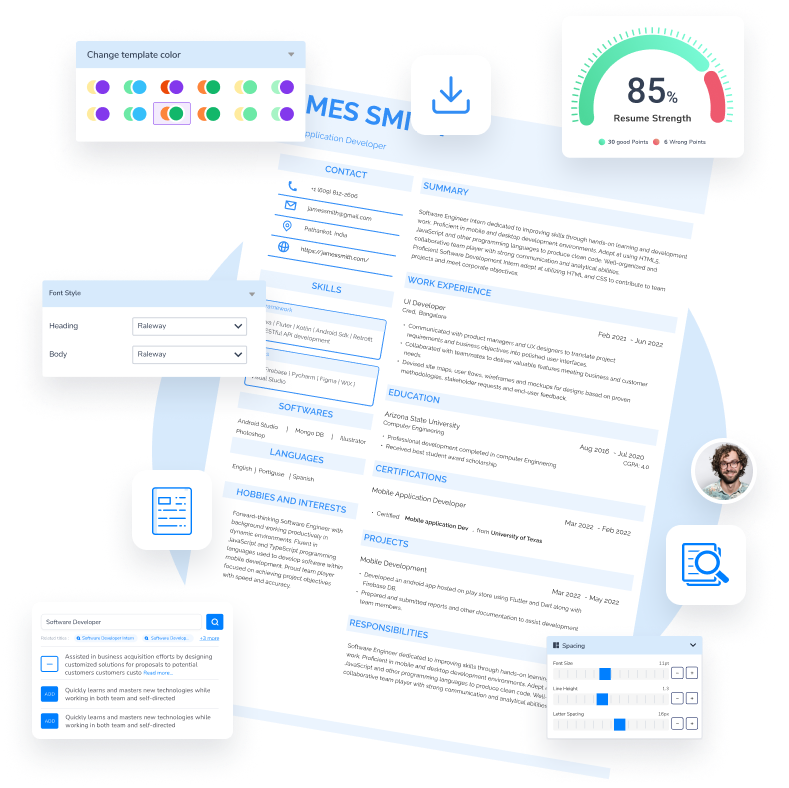Writing Professional Experience in a Resume: Dos and Don'ts
8 min read

Your professional experience is much more than an ordinary section in your resume. It indicates what you bring to the table. This section tells what and how well you have done it.
This blog will discuss how to mention professional experience in a resume. But before that, let's understand why it matters!
Importance of Professional Experience in a Resume
The experience section can help applicants' resumes stand out. By adding relevant roles and responsibilities, you demonstrate that you are the right person for the position, eventually enhancing your chances of getting the job. Moreover, it helps employers understand whether the applicant has the potential or previous experience managing similar tasks.
Coming to our main point!
Dos of Writing Professional Experience
Use Action Words
When talking about duties and achievements, make sure to use powerful action verbs. These verbs and words can make your resume more impactful and capture hiring managers' attention. Also, they convey energy. These words reflect your proactive approach and show how you have contributed to the success of your previous company. Some common words that you can use while writing a professional experience include "managed," "streamlined," "led," etc.
Be Concise
Always keep your descriptions clear, concise, and to the point. Don't add unnecessary details to this section. It can make your resume dull and unattractive. Therefore, keep this section concise. Make every word count. Only write if a word adds value to your resume. If you need help to make your resume concise, do it with the help of an online summarizing tool. A sophisticated text summarizer can instantly summarize the provided details, making your bullets much shorter and more valuable.
Quantify Achievements
Remember, numbers always speak louder than words when it comes to resumes. They demonstrate how valuable you can be for the organization. So, add numbers to showcase your achievements. For instance, instead of "Enhanced Sales," write "Increased sales by 67% in a year." It's far more compelling. Quantifying your achievements also proves that you are a results-driven person capable of delivering measurable and outstanding results.
Add Relevant Keywords
No matter what, remember to add relevant keywords to this section. Often, job seekers create a general resume and send it to everyone. It's an entirely wrong approach. Tailor your resumes according to each position. First, read the job description, find relevant keywords, and adjust them in your resume. This way, you can easily bypass the applicant tracking systems (ATS) and catch hiring managers' attention.
Use Reverse Chronological Order
List them in reverse chronological order if you have worked at multiple companies or positions. At the top, mention your most recent experience. Recruiters want to see applicants' current expertise and accomplishments first.
Don'ts of Writing Professional Experience
Don't Include Irrelevant Experiences
Many people love mentioning all their experiences in their resumes, regardless of whether they align with the position they are applying for. In most cases, this practice only works sometimes. Including unrelated experiences distracts employers from observing whether you fit the role. So, you must avoid making this mistake. Instead, only add relevant experiences.
Avoid Repetition
Make sure to bring some diversity to your resume. Use the same word sparingly. Repetition can make your resume dull and unattractive. Instead of using a word multiple times, search for its alternatives using Google, thesaurus platforms, or ChatGPT and add it to your resume.
Don't Use Jargon
Jargon and highly technical terms generally offer few benefits. Instead, they confuse hiring managers. Remember, before your resume reaches the technical staff, it passes through ATS and hiring authorities with limited technical knowledge. So, craft your resume, especially the experiences section for them. And for that purpose, make sure to use simple language.
Never Lie
Never make false claims in your resumes or fabricate job titles to capture employers' attention. It can backfire if employers verify the details. Remember, even minor exaggerations can damage your credibility. Therefore, always provide accurate and verifiable information.
Avoid Grammar Errors
Grammar, spelling, and syntax errors can also ruin your resume. No matter how well-crafted your resume is, you will only get the desired response if its sections contain many grammar mistakes. Therefore, never avoid grammar errors. Before sending it to anyone, thoroughly proofread your resume and only send it if it's free from all sorts of mistakes.
Conclusion
Writing a professional experience section is relatively easy. However, there are some minor details that a person needs to focus on. They can either make or break a resume and its impact. Here, we have briefly talked about them. So, when you write a resume, consider it at any cost.

Try Now for Free!
